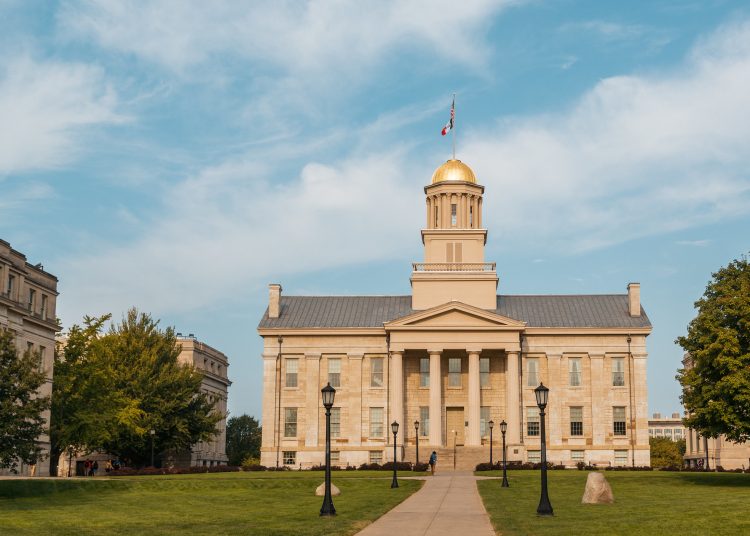DES MOINES, Iowa – An Iowa House bill, HF 49, that eliminates tenure at Iowa’s Regents universities passed out of the Iowa House Education Committee by a mostly party-line 12 to 9 vote on Wednesday.
Iowa’s Regents universities include Iowa State University in Ames, the University of Iowa in Iowa City, and the University of Northern Iowa in Cedar Falls.
The Iowa Board of Regents defines tenure as “a contractual employment status under which faculty members can receive job security in order to create and maintain an atmosphere for the free exchange of ideas and inquiry necessary for educating Iowa’s students and advancing knowledge in democracy.”
Universities can terminate tenured professors if they do not meet employment obligations, in cases of program termination, or financial hardship for the university. The tenure system does make it difficult, if not impossible, to remove professors for any other reason. At Regent universities, tenure track professors have a probationary period that lasts approximately six years.
According to the Iowa Board of Regents 2020 Tenure Report, in the 2019-2020 school year, there were 2,495 tenured professors representing 41 percent of the 6,028 professors on the three campuses. There were an additional 782 tenure-track professors (13 percent). These numbers represent a slight decline since the 2017-2018 school year when there were 2,560 tenured professors and 840 tenure-track professors.
State Rep. Skyler Wheeler, R-Orange City, said universities meant tenure to protect the diversity of thought, which, he says, no longer exists on college campuses.
“Clearly, in our Regent universities, there is no longer diversity of thought. According to a study on the top 40 colleges, about four years ago, on average, for every one Republican college professor, there are 12 Democrats. This number is staggeringly higher when you look at the history departments, which are 30 Democrats for every one Republican. That doesn’t look like diversity of thought to me. These are public universities paid for by taxpayer dollars,” he said.
State Rep. Mary Mascher, D-Iowa City, said she plans to offer an amendment to this bill, which she argues will hurt Regent universities.
“Tenure is a way of recruiting quality faculty and staff. And it’s one of the things that we use at the universities to be able to maintain that quality. We would be the only state in the nation to not allow tenure on this path,” she said.
“I’ve always believed Iowa is a quality place, and we stand alone. But I don’t believe this would create a good impression of our state and our educational system because it would suffer greatly if we were to abandon or eliminate tenure. Tenure does not mean someone is never evaluated. Again, they are evaluated annually, and they can be terminated for cause at any time if they have done something in violation of the protocols or the requirements of their job. So that is is a total fallacy,” Mascher argued.
She said it would also provide other states with tenure an opportunity to poach the Regent universities’ best professors.
“It’s important for us to recognize the damage, the permanent damage, this would do to our institutions, and why it is so important for us to keep those quality professors. The students follow the professors,” Mascher added.
She also argued that Regent universities are economic engines for the state when they receive grants to do research. She noted that the University of Iowa was involved in the development of the Pfizer COVID-19 vaccine.
“When I look at the impact of the universities, for the University of Iowa alone, and this was a few years back, they showed that it had a $6 billion impact on the state of Iowa’s income. Because it was also not only the people who were getting the grants and receiving the opportunity to do the research, but it was also all the people they hired. And so, I look at our institutions of higher learning as economic engines for the state. And our research parks would indicate that as well,” Mascher stated.
State Rep. Molly Donahue, D-Cedar Rapids, agreed and said the state couldn’t afford to lose the research money the Regent universities bring in.
Wheeler, in his closing remarks, pointed out no one else has this kind of job security.
“We are elected to two-year terms in here. Judges are up for retention votes every eight years. And why are we giving professors a lifetime appointment on the taxpayers’ dime? A chunk of the faculty right now is not tenure track faculty, yet many people still apply and teach at the Regents. This doesn’t change the contracts or the systems that are in place. This simply removes a mechanism that protects bad professors,” he said.
“I would ask the question, Mr. Chair, would you use the surgeon who had tenure or the surgeon that didn’t have tenure? Would you fly on the airplane with the pilot that had tenure? Or the pilot that did not have tenure? Mr. Chair? The idea of tenure was to protect diversity of thought on college campuses. And it is clear at our Regents universities. There is no longer diversity of thought,” Wheeler concluded.
While the vote was primarily a party-line vote, State Rep. Garrett Gobble, R-Ankeny, voted with the committee’s Democrats against the bill.
“While I believe that ideological discussions at our universities need to be better balanced, I feel removing tenure is going after the wrong thing and could lead to unforeseen problems,” he told The Iowa Torch.
State Reps. Chad Ingles, R-Randalia, and Thomas Moore, R-Griswold, also joined Democrats in voting against the bill.
The bill is now eligible for debate before the entire Iowa House of Representatives.
*This article has been corrected, originally The Iowa Torch identified State Rep. Garrett Gobble as the only Republican to vote against the bill, but there were three Republican no votes for the bill. We regret the error.















